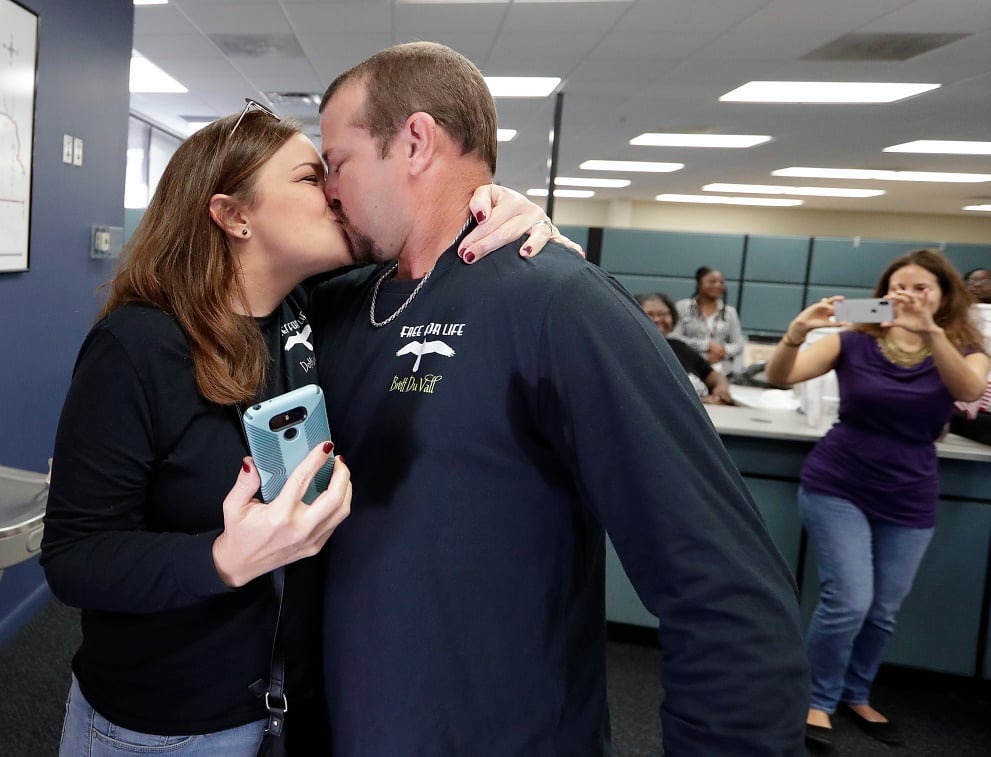TALLAHASSEE, Fla. (CN) — Florida’s top advocate for expanding voting rights to felons understood eligibility may depend on paying restitution and fines, attorneys for the state argued Friday as a closely watched federal voting rights trial continued.
Desmond Mead, the executive director of Florida Rights Restoration Coalition, testified in a deposition that the backers of Amendment 4, a ballot measure restoring the right to vote to most felons, assumed those released from prison would have to pay all restitution and fines before registering to vote.
The trial, held via teleconferencing due to the coronavirus pandemic, revolves around SB 7066, a law passed last year to implement the constitutional amendment approved by voters in 2018.
The language of Amendment 4 restores voting rights to most felons “after they complete all terms of their sentence including parole or probation.” The amendment itself did not mention restitution or fines.
Seventeen felons sued Republican Governor Ron DeSantis, Secretary of State Laurel Lee and several supervisors of elections over SB 7066. The plaintiffs’ attorneys contend the law circumvents the ballot measure with onerous roadblocks that could prevent felons from ever exercising the right to vote.
They claim requiring the payment of all of restitution, fines and court costs disproportionately affects mostly poor, black felons and amounts to an unconstitutional poll tax.
The state’s attorneys argue voters knew felons must pay all fines and fees before voting when they passed Amendment 4 and SB 7066 simply clarifies the measure.
On Friday, they referenced Mead’s deposition and a December 2018 letter sent by his group and others to the secretary of state, which acknowledged “all terms of a sentence” included restitution and fines ordered at the time of sentencing.
But Mead stopped short of saying that was the intention of Amendment 4.
“We weren't anticipating, a year later, that someone is going to dissect this thing and, because of the omission of one or two words, come to the conclusion that every piece of financial obligation that someone has should be hung around their neck, and should prevent them from voting,” Mead said.
He also distinguished between financial obligations as the result of a sentence, such as restitution, and court costs.
“Sometimes in our conversations, the administrative costs and punitive costs get interchanged so easily and grouped together, when in reality, they're separate and distinct,” Mead said. “And I don't think that that distinction was made. And it should have been made, if nothing else, for clarification purposes.”
Attorneys for the state also called on Michael Barber, a political science professor from Brigham Young University, to criticize aspects of a study submitted by one of the plaintiffs’ experts.
Daniel Smith, a political science professor from the University of Florida, found more than 774,000 felons have some type of legal financial obligation and a disproportionate amount are black. The study did not analyze the fines and fees of Latinos released from prison.
“Leaving out Latinos could be a significant oversight,” Barber said. “Mischaracterizing Latinos could dramatically change the results and interpretations of them.”
Barber also criticized other expert testimony that suggested Republican lawmakers passed the law to reduce the amount of potential black voters, because they tend to vote Democratic.
“The outcome is incredibly unclear on what would happen with felon re-enfranchisement,” Barber said.
U.S. District Judge Robert Hinkle of the Northern District of Florida took issue with that statement.
“If you don’t think re-enfranchisement helps Democrats or Republicans, how is it that every Republican voted yes [for SB 7066] and every Democrat voted no?” asked Hinkle, a Bill Clinton appointee.
“A lot of legislators think something will happen when they implement policy X, when in fact there is a wildly different outcome,” Barber answered.
The American Civil Liberties Union, Campaign Legal Center and other criminal justice groups brought the case, Jones v. DeSantis, on behalf of the plaintiffs last summer.
Mead and the Florida Rights Restoration Coalition did not join the suit. In his deposition, Mead said his group has always tried to stay above partisan politics.
“We didn't see a need to insert ourselves,” Mead said. “Let the lawyers do the lawyer stuff. Let the politicians do the politician stuff. We wanted to do the people stuff.”
In October, Hinkle issued an injunction blocking SB 7066 for the 17 plaintiffs in the case. In February, the 11th Circuit upheld the injunction and later denied the state’s request for an en banc rehearing.
Earlier this month, the judge approved a class action certification in the case and signaled his decision in the trial will apply to all affected felons in Florida, not just the 17 plaintiffs protected by the initial injunction.
The trial is expected to last until the middle of next week.
Subscribe to Closing Arguments
Sign up for new weekly newsletter Closing Arguments to get the latest about ongoing trials, major litigation and hot cases and rulings in courthouses around the U.S. and the world.









